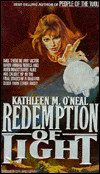Kathleen M. O’Neal, Powers of LIght trilogy
reviewed by Michael J A Tyzuk

|
|
Powers of LIght trilogy Author: Kathleen M. O’Neal Abyss of Light Publisher: Penguin Released: April 1990 ISBN: 0886774187 Treasure of Light Publisher: Penguin Released: November 1990 ISBN: 0886774551 Redemption of Light Publisher: DAW Released: April 1991 ISBN: 0886774705 Paperback: 528 pp. Price: 18¢ or slightly more |
I tried to read the book on the long (18 hour) bus ride from Vancouver to Edmonton, but a couple of things prevented me from doing that. First of all, they played Return of the Pink Panther and Dorf on Golf on the bus ride and the comedy seemed more important than the sci-fi. Secondly, once the movies were over and I tried to read the book again, I found that I just couldn’t get into it. So it went into the bag and I didn’t think of it for a while.
Then one day I was at home looking through my rather substantial library for something new to read, and my finger found the cover of An Abyss of Light. I shrugged and decided to give the book a second chance, reasoning that I probably hadn’t given it much of one to begin with. I later discovered that “Abyss” was simply the first book of what was going to be a trilogy. I picked up the next two volumes, Treasure of Light and Redemption of Light, when they were released later, and I’m mighty glad I did.
The trilogy centers around a group of humans, called Gamants, who are being persecuted and oppressed by the Galactic Magistrates because their stubborn sense of individuality prevents them from fitting in either with other humans or the other member species of the Magistrates’ Union of Solar Systems.
At the heart of the conflict is Jeremiel Baruch, the commander of the Gamant Underground, and Captain Cole Patrick Tahn, who starts out as master of the Magesterial cruiser Hoyer but later ends up joining the Underground when the sheer scale of Magesterial atrocities against the Gamants is revealed to him. Together, these two men and their allies are charged with protecting Mikeal Calas, the spiritual leader of the Gamant people and the father of the Chosen One, who is destined to lead the people to their salvation.
There’s a lot of religious depth to this series, and I think that’s what set me off at first. I went to Catholic schools all my life and was constantly pestered by teachers and priests to embrace their teachings instead of questioning what, to them, was obvious and self-evident. I found as I read the books, though, that the deep probe into Gamant religious belief was necessary in order to show why these people were so hated that the Magistrates sought to obliterate them from the face of the Galaxy. And really, the matter of religion is handled quite well, without coming across as overly preachy.
The Magistrates are presented in a way that is more than a little reminiscent of the Nazis of World War II, as they might be if they had been able to survive and make their way out into space. If the Magistrates can be likened to Nazis, then it is only logical that the Gamants can be likened to futuristic Jews, and as the series progresses we learn that this is indeed the case. Though their history has become somewhat fragmented over the centuries, it is easy to see elements of Jewish language and teaching in the brief glimpses we are given of this history.
Based on that premise a lot of people probably missed out on the series because they believed that the overall premise was something that had been done before, entirely too many times. But, as Arthur C. Clarke is famous for saying, if there were any truly original concepts left in science fiction then he would have done them already, The simple fact of the matter is that the stories presented on these three books are quite compelling, and the author is very skilled at hooking your attention and dragging you into the world she wants to show you.
I’ve always been a big fan of the series, but, sadly, when I got divorced some years ago I ended up losing everything, including my library. It’s taken me a long time to build it back up, and I’m almost there. Between local used book stores and eBay I was finally able to regain the last book in the series about three weeks ago. And I’m feeling rather quite obnoxously pleased with myself, thank you very much.
The books were released between the years of 1990 and 1991, so the odds of finding them on a bookstore shelf are slim to none. But if you’re lucky, you can still find a used copy on the Net or in your local used book store. If you have a chance to by one of these books then I recommend that you do so. You won’t be disappointed.
Copyright © 2005 by Michael J A Tyzuk

